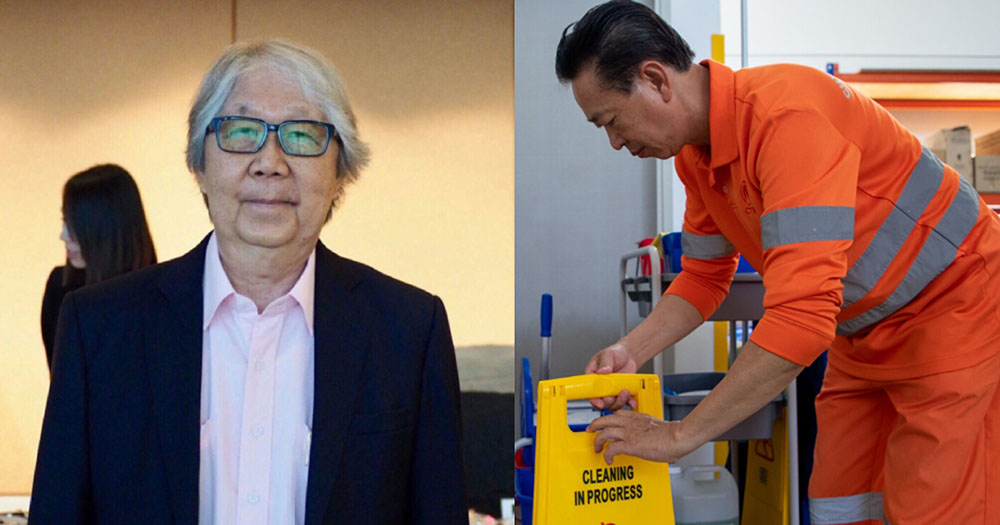Tommy Koh: S'pore is snobbish & 'look down on those who are poor'
The former diplomat called for a more respectful attitude towards people working in jobs that have low wages and are lowly valued.Matthias Ang |

Singapore's ambassador-at-large Tommy Koh called Singapore a "very snobbish and hierarchical society" that is "ruled by money", according to CNA.
In adding that he was "sorry" to give such a description, he said:
"We are ruled by money, so we look down on those who are poor. We are also a meritocracy, we therefore look down on people who are poorly educated. And we have become very snobbish, we look down on people who can't afford to stay in private housing."
In addition, the pandemic has also brought home the fact that people whom Singaporeans look down upon and disrespect are essential to the security and welfare of the country.
"We should have a new, more respectful attitude towards them," he added.
"The truth is that in Singapore, as in the rest of the world, we overpay the brain workers. We underpay what I call the hard workers and we underpay the hand workers. There should be more justice for the hard workers and the hand workers," he said.
The pandemic has made people more aware of the jobs that we really rely on
Koh made his remarks on CNA's podcast 'Heart of the Matter' to host, Steven Chia.
The episode also featured President of PPIS (Persatuan Pemudi Islam Singapura or the Singapore Muslim Women’s Association) Hazlina Halim, and 21-year-old university student, Laura Sim.
He added that one of the positive outcomes of the pandemic was how it made people aware that workers in jobs that have low pay and are considered of low value are important to one's security and welfare.
Koh cited nursing as one such job and noted that Singapore paid nurses "very poorly" compared to Hong Kong and Australia.
"So I will say to the Singapore government: if we really truly value our nurses, pay them better," he said.
Other jobs he cited included the occupations of cleaners, security guards, supermarket employees and public transport staff.
Singapore has missed the mark of becoming a society with few poor, few rich and many middle-class people
When asked by Chia if Singapore had ended up in its current state because of its economic growth, Koh said that it did not have to be this way.
The former diplomat cited a conversation between the late Lee Kuan Yew and one of China's first ambassadors to Singapore in which the ambassador asked at length about the kind of society that Lee was trying to build.
Lee replied that in terms of the income distribution, he was attempting to build a Singapore shaped like an "olive", with very few poor people and very few "super rich" people, but with a very large middle.
Koh then pointed out, "But I'm sorry, we missed that. When I recently plotted the income profile of Singapore, it doesn't look like an olive. It looks like a pear. Is that what we want? I don't think so."
Koh added that such an outcome was not inevitable or a consequence of capitalism.
He cited the Nordic countries and Switzerland as examples of countries where their superior degree of equality, compared to Singapore, did not detract from their competitiveness.
"If you look at the World Economic Forum of the rankings of competitive countries, these more egalitarian societies rank very high in the index, so there's no necessary contradiction between more equal and less competitive, which is what the Singaporean thinks," he said.
Embracing failure is key
Koh's next point was on the importance of embracing failure.
Here, he pointed to the U.S. as an example.
"If you look at the most successful economy in the world, the American economy, you ask yourself, why are they so successful?
One of the reasons is that there's a general culture of accepting honest failure. If you fail you're not stigmatised as you are in Singapore. If you fail in Singapore, you're finished. But in America if it's an honest failure, people don't stigmatise you. They expect you to get up and try again. Try until you succeed. That's the culture we want."
When Chia asked how long it would take for a mindset shift to occur, with concrete changes in reality within Singapore, Koh replied, "Nobody can answer that. But I'm optimistic. I'm optimistic."
He elaborated:
"When I look back on the last eighty years, I couldn't have imagined, when I was a child, the wonderful state of affairs that we have in Singapore. The level of development, prosperity, education, welfare and so on; to my generation it's unbelievable. It's a miracle.
The question is: Going forward, will our next generation be able to meet the new challenges of the new world? Every generation faces a different set of challenges."
Top left photo by Sulaiman Daud, right photo via NEA/FB


